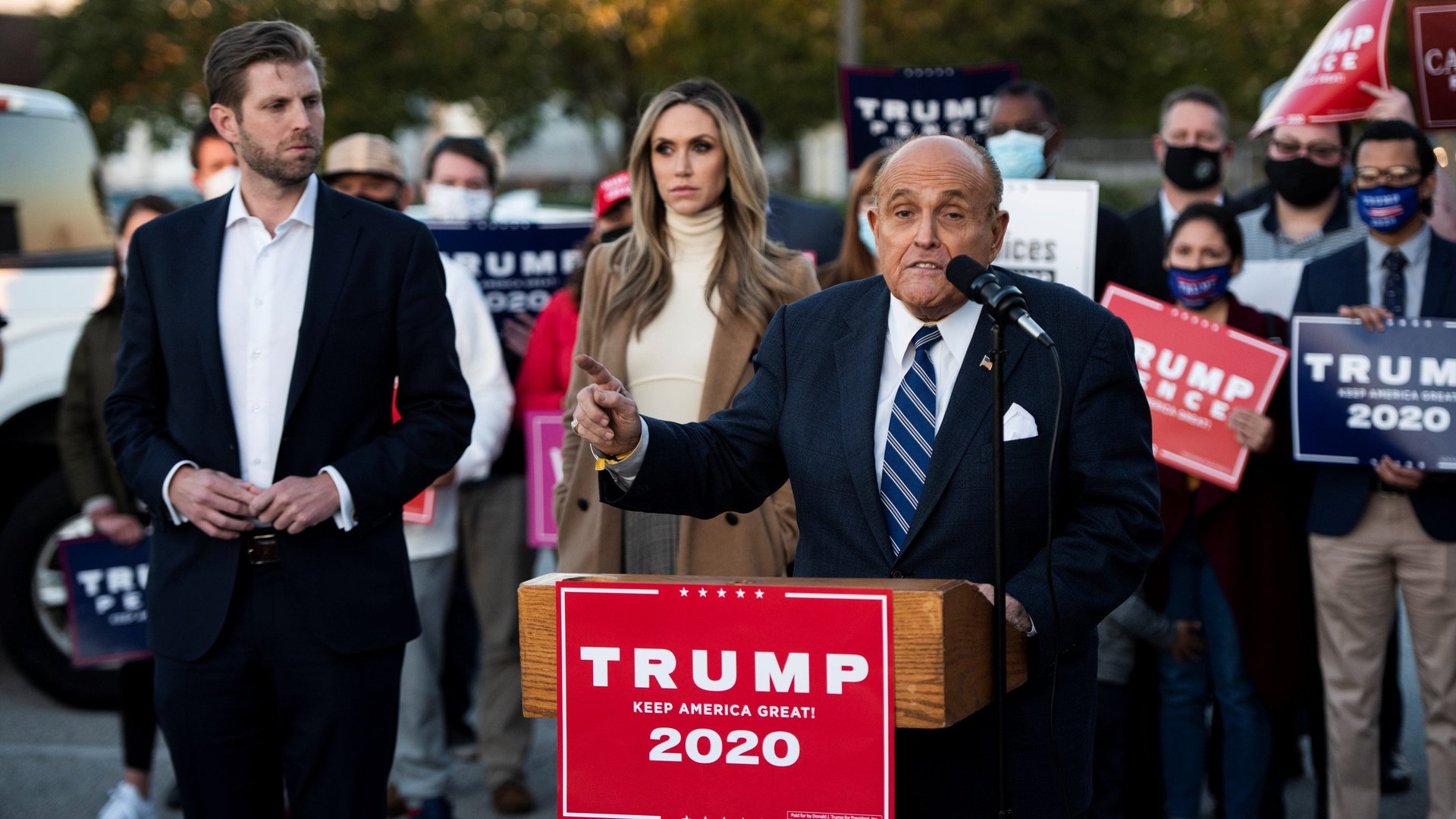All the lawsuits the Trump campaign has filed to challenge the results of the election
Even before it became clear that Joe Biden would win this year’s presidential election, Donald Trump had launched a legal campaign to challenge his opponent’s gains in swing states.


Even before it became clear that Joe Biden would win this year’s presidential election, Donald Trump had launched a legal campaign to challenge his opponent’s gains in swing states.
Trump’s strategy hinges on a unique dynamic in this year’s vote: Because of the coronavirus, a record of more than 65 million ballots were cast by mail. Democrats were more likely to vote by mail this year, so these ballots disproportionately favored Biden. That means results coming in on election day tended to favor Trump but shifted as absentee ballots were counted—what’s called a “red mirage.” Trump seized on this to falsely allege widespread fraud. So far, the courts have not sided with him.
Both campaigns have had teams of lawyers at the ready for weeks, preparing for precisely these sorts of expensive and drawn-out election-day challenges. They have been raising money with supporters to fund these efforts; the Biden campaign has even created what it calls the Biden Fight Fund for that purpose.
Separately, after the Associated Press declared Biden the winner in Wisconsin with a lead of some 20,000 votes, Trump campaign manager Bill Stepien said the president would “immediately” request a recount. In Wisconsin, if the result of a race is within one percentage point, the losing candidate can force a recount, but not before every county sends its final tally to the state elections commission, likely in mid-November. (If the difference in votes is greater than one percentage point, the loser can still request a recount—at their own expense. The most notable recent example happened in 2016, when Green Party presidential nominee Jill Stein paid $3.5 million to secure a recount in Wisconsin that only yielded an extra 100-odd votes for Trump, who carried the state by a margin of more than 22,000 votes.)
“The level of litigation has just been so unprecedented,” Sophia Lin Lakin, deputy director of the American Civil Liberties Union’s Voting Rights Project told The Associated Press. “It does feel like there’s a desire to elevate any possible thing.”
This week the Trump campaign and Republican officials with ties to the campaign have filed lawsuits in four states and before the US Supreme Court. You can find a partial list below, which we will continue to update:
Georgia
The Georgia Republican Party and Trump filed a suit (pdf) in the Superior Court of Chatham County alleging that the Chatham County Board of Elections accepted absentee ballots that arrived after 7 pm on Nov. 3, Georgia’s contested deadline. It included an affidavit signed by a poll watcher from South Carolina who claimed a poll worker in Chatham county mishandled 53 ballots.
A judge dismissed the lawsuit earlier this week.
Nevada
The Trump campaign, the Nevada Republican Party, and a Clark county poll watcher filed a lawsuit in late October against Nevada secretary of state Barbara Cegavske and Clark County voter registrar Joseph Gloria. They asked the judge to halt early vote counting in the county because Gloria failed to submit a written plan to accommodate members of the public seeking to view the delivery, counting, handling, and processing of absentee ballots by April 15, as required by state election laws.
A Carson City District Court judge ruled on Monday (Nov. 2) that there was no evidence of improper vote counting in Clark county.
The campaign then filed an emergency request before the Nevada Supreme Court, demanding that Clark county election officials give more access to election observers and stop processing mail-in ballots using the “duplication” technique.
The Court unanimously denied the request.
Pennsylvania
The Trump campaign filed a motion in the Supreme Court on Nov. 4 to intervene in an existing dispute over whether absentee ballots arriving after election day can be counted. Of all the cases filed by the Trump campaign in recent days, legal experts say this is the most likely to go somewhere.
In late October, the US Supreme Court let stand a ruling by the Pennsylvania Supreme Court allowing mail-in ballots postmarked by election day and received up to three days afterwards to be counted. But conservative justices Samuel Alito, Clarence Thomas, and Neil Gorsuch wrote that the Pennsylvania court’s decision may have violated the US Constitution and should be reviewed.
In a separate case (pdf), a Republican candidate for Pennsylvania’s 4th Congressional District and a local Republican official filed a complaint in the US District Court for the Eastern District of Pennsylvania against officials in the Montgomery County Board of Elections. They allege that the election officials were “illegally pre-canvassing mail-in ballots received before Nov. 3 and, in certain instances, providing the electors submitting such illegally pre-canvassed ballots that are found to be deficient an opportunity to re-vote on or before Nov. 3.” They also said that the Montgomery County Board of Elections didn’t provide poll watchers enough access to the absentee ballot counting process.
The case is ongoing.
Michigan
The Trump campaign and Eric Ostergren, a Michigan resident and poll watcher who says he was inappropriately “excluded from the counting board during the absent voter ballot review process,” filed a lawsuit (pdf) against Michigan secretary of state Jocelyn Benson on Nov. 4. They alleged that Michigan absentee voter counting boards were not complying with an election law mandating that “at least one election inspector from each major political party must be present” at all times.
In a hearing this week at the Court of Claims, Judge Cynthia Stephens rejected the case and said the court couldn’t satisfy plaintiffs’ requests since the “essence of the count is completed.” She closed by saying: “I believe everyone here, at their best, seeks to have a full and fair election process.”